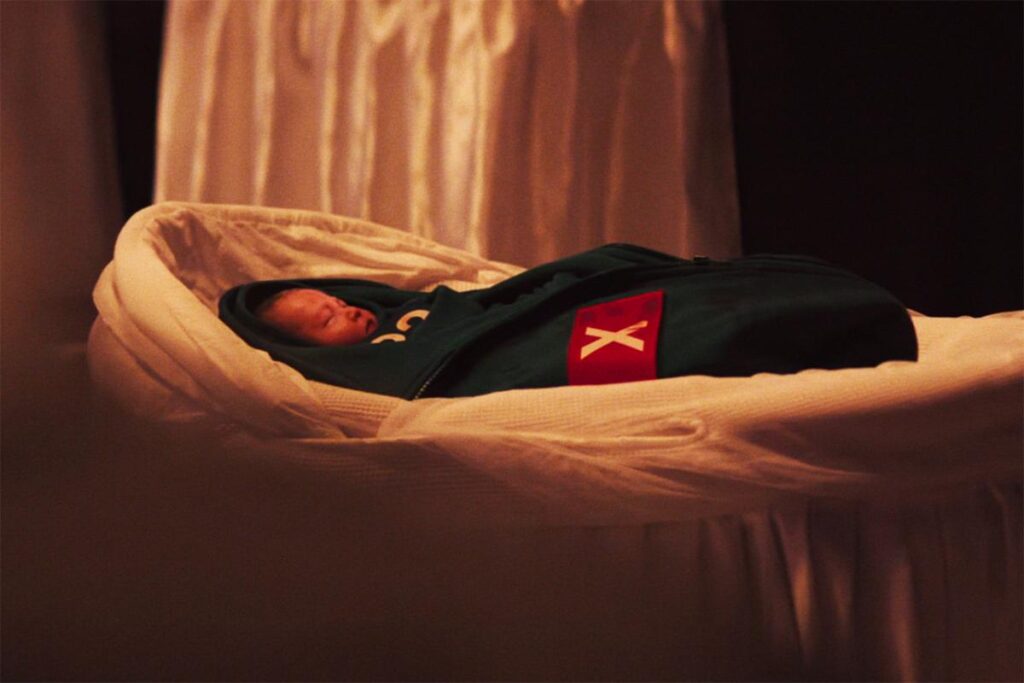Okay, fine, I’m gonna come right out and ask it: Are they gonna kill the baby? I know this is television and 99 times out of 100 shows that aren’t Game of Thrones or House of the Dragon are not gonna kill the baby. But this is Squid Game. Yanking the audience’s heartstrings as hard as possible until the damn things snap is what Squid Game does. So I’ll ask it again: Is Squid Game gonna kill that goddamn baby?
Before you dismiss the possibility, consider the fates of all the other gentle souls who’ve braved the games over the course of Seasons 2 and 3. Geum-ja, the kindly old lady? She killed herself after killing her son to stop him from killing the baby’s mom. Jun-hee, the injured young mother? She kills herself in this episode, flinging herself off a cliff rather than try and fail to get past the Jump Rope obstacle, leaving her baby’s fate in Gi-hun’s hands.
It goes on. Hyun-ju, Geum-ja and Jun-hee’s kind but formidable friend and defender? Murdered accidentally-on-purpose by Myung-gi, the baby’s father. Min-su, the timid young man who got into debt through no real fault of his own? Reduced to a zoned-out pill-popper who’s experiencing the events befalling him like an acid-tripping soldier near the end of Apocalypse Now. Jung-bae (Lee Seo-hwan), Gi-hun’s lovable-loser buddy? Executed by the Front Man before Gi-hun’s very eyes.
And his killer? The seemingly kind-hearted player 001, Young-il, who Gi-hun believed to be his friend until the Front Man unmasked and revealed the ruse in this very episode. This results in one of Lee Jung-jae’s most dramatic face journeys to date, which is really saying something.
This hour-plus episode is divided into two sections. In the first, the surviving two dozen players attempt to best the Jump Rope game. Some are intent on killing each other first and foremost, which forces Gi-hun to deck and kill some asshole who keeps pushing people off the edge when they make it to the other side. It’s only through Gi-hun’s good graces — and his willingness to squash a man’s eyeball with his thumb on screen — that anyone else survives at all.
Not that this stops Mr. 100, the biggest debtor in the game, from immediately turning on not only Gi-hun but the baby in his charge once the game is over. Gi-hun personally intervened to save this asshole, but the moment he hears from the guards that the players themselves get to select who’s eliminated in the next game — a minimum of three must go; the maximum is up to the players — contestant 100 issues Gi-hun, Min-su, and the baby a death warrant. It’s one the other players are all too eager to enforce.
The baby is only a factor because of the intervention of the VIPs, a disgusting and degenerate bunch of mostly young-ish, English-speaking rich assholes who sit around and snark and flirt and drink and generally have the time of their lives while other people die for their entertainment. It’s their idea to make the baby an official player in place of its late mother, and they seem as excited to see it murdered as any of the potential player-murderers do. As for the Front Man, he gives Gi-hun an ornate knife with which to defend himself — or stab the Front Man to death, if he wants, though it’s clear by now the games will go on with or without any one individual.
The key to it all may be the Front Man’s IRL brother, Jun-ho. By now this dogged ex-cop and his band of mercenaries have narrowed down the location of the game island so well that the Front Man gives the order for their erstwhile friend Captain Park to murder them all. Jun-ho comes out on top, barely, with only one other member of his team surviving.
Player 256 is out on the water, too. Freed by rogue guard No-eul, he takes off on a motorboat after she returns to the island following a threat against the man’s sick child from her superior officer. She’s using herself as a diversion so the kid’s dad can make it to safety through the foggy sea.
And through it all, that cheery Squid Game strangeness fuels the whole thing. During the Jump Rope game, drugged-out Min-su sees the gigantic little-boy statue smiling at him; hundreds of feet below him, crumpled bodies lie in pools of their own blood against a painted field of flowers spanning the floor. After the game, the eight surviving adult contestants, all men, are dressed up in black tie and fêted with an all-you-can-eat dinner in front of the piggy bank full of money, in a room with wall-to-wall black-and-white tiling. The visual echoes two of television’s great works of sinister surrealism, Patrick McGoohan’s The Prisoner and David Lynch & Mark Frost’s Twin Peaks.
Across the walls, in huge letters, a Latin saying is inscribed: “Hodie Mihi, Cras Tibi.” It’s a memento mori kind of sentiment; put simplest, it means “Me today, you tomorrow.” The meaning is twofold. In one sense, it’s the obvious truth of the games: someone will die today, and someone who watches them die will die the next day.
But depending on how you read it, it’s neither a lament nor a grim reminder, but a warning, even a promise. You may be on top now, but tomorrow is another day. And if you’ve put a baby on your hit list, don’t be surprised if people hit back.
Sean T. Collins (@theseantcollins) writes about TV for Rolling Stone, Vulture, The New York Times, and anyplace that will have him, really. He and his family live on Long Island.
Read the full article here


